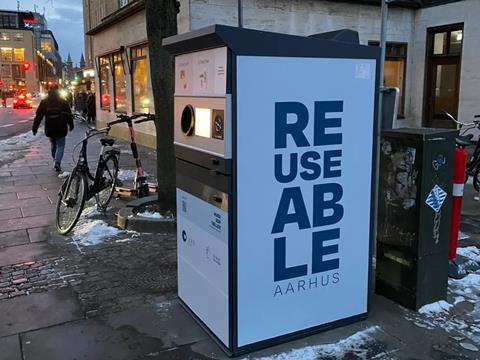
TOMRA and the municipality of Aarhus are piloting the ‘world’s first’ open-managed system for reusable takeaway packaging – a solution expected to help entire cities transition away from single-use packaging.
The three-year pilot project enables packaging from different food and drinks providers to be returned to a shared infrastructure of automated collection points throughout a city. These are accessible 24/7 and hope to incentivize high return rates by reimbursing deposits paid by consumers when purchasing their products.
In its initial stage, the system is compatible with hot and cold drinks containers, like takeaway coffee cups. Consumers are encouraged to tap a contactless payment credential – such as a card, phone, or smartwatch – to activate the collection point, with deposits then returned directly to the consumer’s card or account. This payment system is facilitated in a collaboration with Visa, MasterCard, and Shift4.
Alongside the automated collection machines, TOMRA empties the machines and transports the packaging to a dedicated industrial sanitization facility in Aarhus. Once sanitized, the cups undergo quality inspection; then, when retailers order new supplies through an online webshop, the containers are re-entered into the system.
This system negates the need for businesses to collect and sanitize their own packaging, which TOMRA says has hindered reusable takeaway packaging systems in the past.
In the future, it is intended to incorporate other types of takeaway packaging and provide a holistic, convenient, and transparent reuse scheme within cities. Expected to benefit both businesses and consumers, it is set to optimize the use of resources and keep litter out of the urban environment.
Compared to an ongoing use of single-use takeaway packaging, the system is set to unlock a ‘significant’ decrease in greenhouse gas emissions. A recent study suggested that shifting away from single-use cups for both hot and cold drink could reduce emissions by at least 70%.
Embracing reusable takeaway packaging is also anticipated to create local jobs in the community.
“Aarhus wants to be a greener and more sustainable city, and one which has the courage to test new solutions,” says Nicolaj Bang, alderman for Technical Services and Environment, Aarhus Municipality. “That is why I am really happy that today Aarhus is launching its own deposit system for to-go cups, and that there are so many food establishments in the city that have already shown an interest in providing the cups.
“We have worked hard in recent years to make this happen, and now it’s time to really test its application in reality. I hope that the residents of Aarhus will embrace this new to-go cup system and that during this pilot project we will hopefully be able to take the next steps needed to expand the system to include several types of takeaway packaging.”
Tove Andersen, president and CEO of TOMRA, continues: “This is a very important project for TOMRA and a key part of the ambitious plans to use our systemic know-how and technological expertise to create new innovative solutions that will provide expanded benefits for businesses, consumers and society.
“We are thrilled to be able to partner with such a forward-thinking city as Aarhus, and look forward to the positive impact we can make together in shaping a more sustainable future.”
Geir Sæther, TOMRA’s senior vice president and head of TOMRA Reuse, added: “TOMRA believes reusable takeaway packaging will be an increasingly important and necessary part of a circular approach to waste management, and we are determined to provide novel, attractive and efficient solutions to enable this. We believe that a shared infrastructure with automated collection points is a prerequisite for successful implementation.
“In addition to the technical setup, another key success factor for broader adoption is that the system is accompanied by policy frameworks that will ensure that these systems are utilized. We are confident that with this pilot project we will demonstrate that reusable takeaway packaging is a viable alternative going forward.”
The news comes after TOMRA and central system administrator MOHU launched a new deposit return scheme for single-use drinks containers in hopes of optimizing the process of returning used packaging for new recyclers.
A centralized deposit return system for single-use beverage containers – claiming to be one of the world’s largest and utilizing Sensoneo’s ready-to-integrate IT system – is also being rolled out in Romania.
Meanwhile, a reusable food and drink container service from Reconomy aims to lower carbon emissions by up to 96%, reduce landfill and litter, and deliver cost savings of around 70-85%, including lower storage and transport costs.
If you liked this article, you might also enjoy:
The Lidl approach to packaging sustainability
How did Brazil achieve its 100% aluminium can recycling rate – and can it be replicated in the EU?
Experts have their say on the EU’s Packaging and Packaging Waste Directive revisions
A deep dive into the most important packaging sustainability trends and solutions













No comments yet